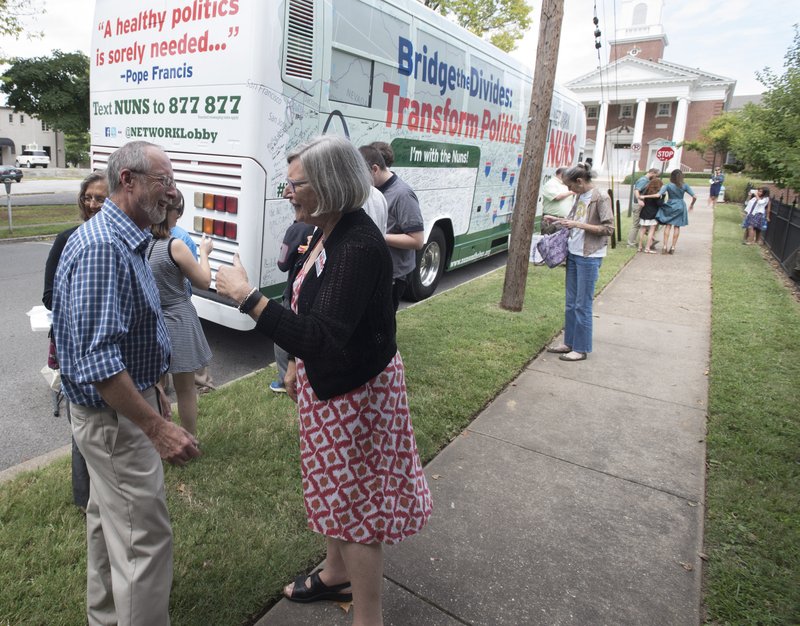FAYETTEVILLE -- People listed social issues of importance during a town hall meeting for the Fayetteville stop of the Nuns on the Bus tour at St. Paul's Episcopal Church Sunday.
Civil rights, low wages, political tensions, the plus and minus equation of large local corporations influencing most of the area's philanthropic efforts all made the list. Proposed solutions included more mental health services, sick leave for those in low-income jobs and expanded child care offerings free to low income mothers.
The bus tour had not been to Arkansas before Sunday, said Sister Simone Campbell, executive director of NETWORK, a national Catholic lobby that put together the Nuns on the Bus tour.
Pope Francis has called for an economy of inclusion, Campbell said and political inclusion is part of that equation. Their listening tour will inform their efforts in Washington but also stir local discussion, sisters said.
"So often those who hold economic power believe they should hold political power," Campbell said.
Campbell joked that in Fayetteville she had found a "Petri dish" of culture. Talking about serious issues with each other is important, she said, urging people to start discussions in grocery store lines and listen to what others have to say.
The mission of the nuns riding the bus is to gather the stories of what is dividing the nation and to bring unity, said Sister Bernadine Karge.
Network was formed in the 1970s to look at the systemic issues facing the nation and to look for solutions, Karge said. The sisters had been chided for political activity in 2012 and the resulting oversight was called off in April, Karge said. That doesn't make the message any less important.
The attitude of "If I have mine then I don't have to worry about anybody," isn't right, she said. The stories of those they meet put a working face on those receiving public assistance.
Part of this year's legislative agenda for the nuns is establishing a living wage linked to inflation. Campbell said she'd met a woman who had to live in a homeless shelter because she can't afford rent but works in a trendy shop.
"We can do better than that," she said.
Food stamps and housing programs were set up as a safety net but so many working people need the aid that they have a new function, Campbell said.
"They're business subsidies," she said.
Business leaders need to pay a fair wage but buyers too hold part of the blame and can't always be pinching for a bargain.
"The cheapest thing is not always the most just," she said.
Bus tour
The Network Nuns on the Bus 2015 Tour is in response to Pope Francis’ Sept. 22-24 visit to Washington. The Pope will continue on to New York and Philadelphia and the nuns plan to lobby Congress to ensure human needs programs are fully funded for the 2016 federal budget. This year’s tour is the fourth and this year’s theme is “Bridge the Divides: Transform Politics.” The nuns said the tour is to listen to the concerns of those marginalized by society and to advocate for politics of inclusion that foster economic justice, prioritize common good and build community where each person’s voice is heard.
For more information visit www.nunsonthebus.org.
Source: Staff report
In St. Louis the nuns met with African-American mothers who are talking with white mothers about what the prejudice their sons face by living in black skins and talked to workers stuck in multiple part-time jobs struggling to make ends meet. In Wichita they were picketed. In Kansas City, Karge heard from a grandmother raising children whose parents have been departed. One of the children attempted suicide to make the grandmother's job easier.
"We need our hearts broken open," said Karge, a Chicago immigration lawyer for 30 years.
Campbell invoked the Constitution noting it is the responsibility of the people to form a more perfect union and to establish justice. Democracy is about having a voice, she said.
"We make the change," Campbell said. No one person should be overwhelmed by the need for change.
"We're one body. No one of us has to do it all," she said.
Each person after prayer and meditation should pick one issue and act on it, she said.
Her role is to help people metabolize their concerns and move them into action, she said.
"I am the stomach acid in the body of Christ," Campbell said.
The meeting resonated with those in attendance.
Earline Dixon, a member of the choir at St. Paul's Episcopal Church said she sees hope in Pope Francis and believes he is interested in creating a better world because he is of the people.
"He really sees life as we see it. He's not stuck up," Dixon said.
Poverty is a huge issue in Northwest Arkansas, said Molly Jensen of Fayetteville.
"The haves and have nots, there's quite a chasm between them," Jensen said.
Economic boundaries tend to follow racial makeup and drive stereotypes but poverty is the root problem, she said.
In her world it is those with little who tend to be more generous and more involved in the community than their richer counterparts, Jensen said.
Women in the Catholic church have never been viewed as powerful, said Hershey Garner, of Fayetteville. Yet, the nuns, the ones who have often been marginalized, have become the face of social justice for the church, he said.
"When Jesus was here he wasn't big on churches either," Garner said, pointing out the women use a bus.
The symbolism of the sisters traveling through the countryside, not dressed in habits and ensconced in a convent but coming to the people echoes Christ's ministry, he said.
NW News on 09/14/2015

